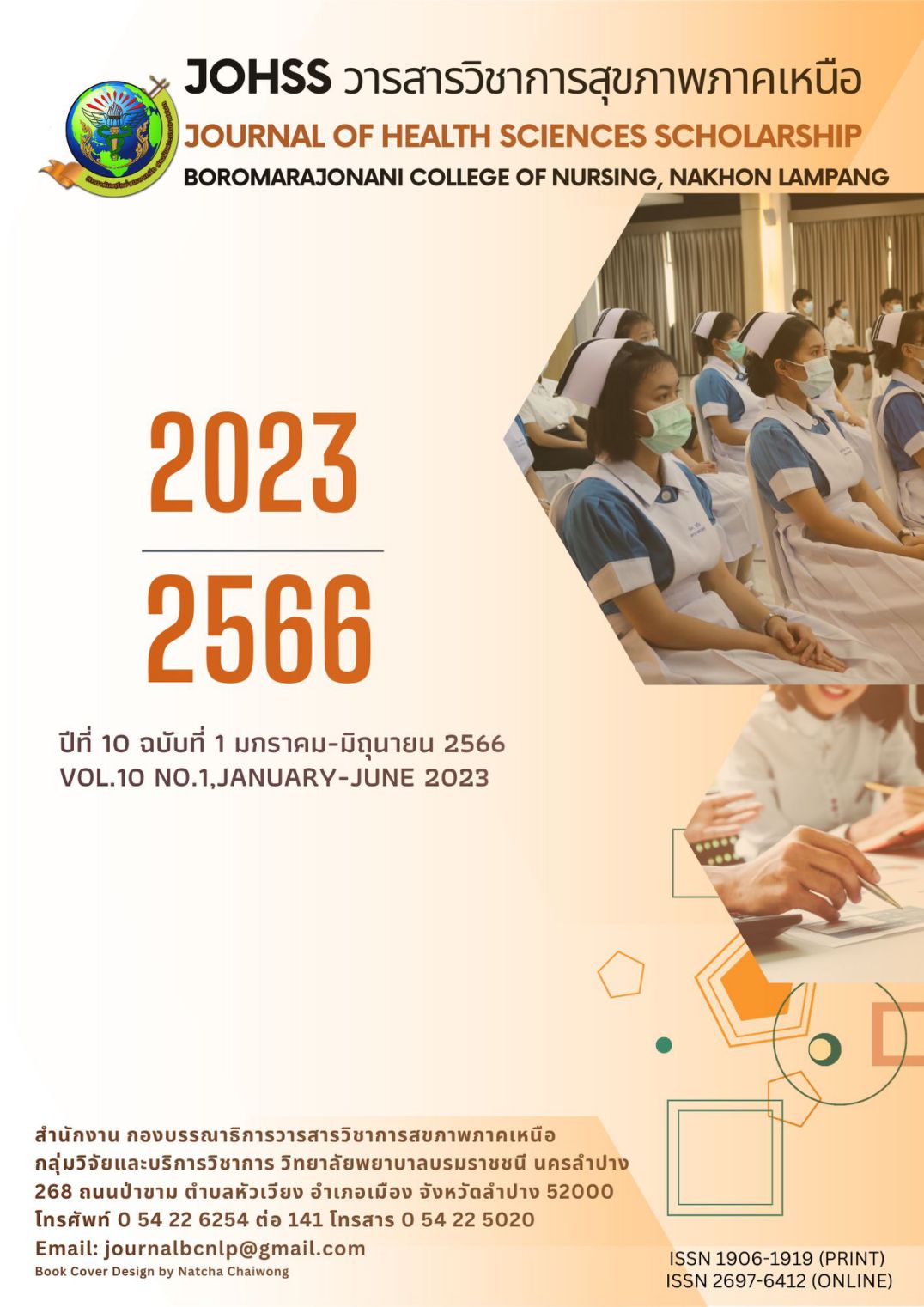ผลของโปรแกรมการเสริมสร้างพลังอำนาจต่อการรับรู้พลังอำนาจของผู้ดูแลผู้สูงอายุเปราะบางด้วยการมีส่วนร่วมของชุมชนในพื้นที่จังหวัดเพชรบุรี
คำสำคัญ:
โปรแกรมการเสริมสร้างพลังอำนาจ, ผู้ดูแลผู้สูงอายุเปราะบาง, การมีส่วนร่วมของชุมชนบทคัดย่อ
การวิจัยแบบกึ่งทดลองครั้งนี้มีวัตถุประสงค์เพื่อศึกษาผลของโปรแกรมเสริมสร้างพลังอำนาจต่อการรับรู้พลังอำนาจของผู้ดูแลผู้สูงอายุเปราะบางด้วยการมีส่วนร่วมของชุมชน ศึกษากลุ่มตัวอย่างผู้ดูแลผู้สูงอายุที่มีความเปราะบาง โดยการคัดเลือกพื้นที่แบบเจาะจงในจังหวัดเพชรบุรีที่มีความต้องการในการแก้ไขปัญหาจำนวน 2 แห่ง แบ่งเป็นกลุ่มทดลองและกลุ่มเปรียบเทียบกลุ่มละ 30 คน คัดเลือกเข้ากลุ่มโดยวิธีการจับคู่ตามลักษณะของเพศ อายุและประสบการณ์ดูแลในเวลาที่แตกต่างกัน ใช้โปรแกรมเสริมสร้างพลังอำนาจด้วยกระบวนการมีส่วนร่วมของชุมชนร่วมกับแนวคิดของเฟลอร์รี่ ในระยเวลา 6 สัปดาห์ ประกอบด้วย 3 ระยะ ได้แก่ ระยะ 1 ประเมินความพร้อมโดยการระบุปัญหาด้านการจัดการ ความรู้สึกและอารมณ์ของครอบครัวที่มีต่อปัญหา ระยะ 2 การเปลี่ยนแปลงโดยการกำหนดเป้าหมาย การแสวงหาทางเลือกเพื่อที่แก้ไขปัญหา และระยะ 3 การผสมผสานเข้าเป็นแบบแผนการดำเนินชีวิตโดยการวางแผนปรับเปลี่ยนความคิด โดยใช้แบบสัมภาษณ์ วิเคราะห์ข้อมูลด้วยสถิติเชิงพรรณนา และเปรียบเทียบความแตกต่าง Paired Samples T-Test และ Independent T-Test
ผลการศึกษา พบว่า กลุ่มทดลองมีคะแนนพลังอำนาจในด้านการรับรู้เกี่ยวกับความสามารถในการทำหน้าที่ด้ านร่างกาย การรับรู้ความสามารถในการทำหน้าที่ด้านจิตใจและสังคม การรับรู้เกี่ยวกับโรคหรือความเจ็บป่วย และการรับรู้เกี่ยวกับความสามารถในการจัดการกับโรคหรือความเจ็บป่วยสูงกว่าก่อนทดลองอย่างมีนัยสำคัญทางสถิติ (p<.05) การค้นพบครั้งนี้ได้ให้ข้อมูลที่เป็นประโยชน์สำหรับบุคลากรด้านสุขภาพที่จะนำแนวทางการเสริมสร้างพลังอำนาจไปวางแผนเพื่อเพิ่มศักยภาพการรับรู้พลังอำนาจของผู้ดูแลผู้สูงอายุเปราะบางในพื้นที่อื่นๆ ต่อไป
เอกสารอ้างอิง
Anderson, R.M., Funnel, M.M., Dedrick, R.F. and David, W.K. (1991). Learning to empower patients results of professional education program for diabetes educators. Diabetes Care. 14(7), 584-590.
Bumrungchon, N., Rattanapiroj, P., & Prada, J. (2014). The development of empowerment program for caregivers of persons with developmental and intellectual disabilities. Journal of Psychiatric and Mental Health Nursing, 28(2), 125-140. (in Thai)
Fleury, J.D. (1991). Empowering potential: A theory of wellness motivation. Nursing Research, 40(5), 286-291.
Jantiya M. (2011). Effects of an Empowerment Program Using Applied Pulmonary Rehabilitation on Health Behaviors of Patients Living with Chronic Obstructive Pulmonary Disease. Journal of Nursing Science.29(2), 8-14.
Junsukon, E., & Kongpracha, A. (2017). The effectiveness of an empowerment the program of self-care competency among community- dwelling elders. PSRU Journal of Science and Technology. 2(1): 24-34. (in Thai).
Ministry of Social Development and Human Security. (2015). Social statics document. Bangko: Information and Communication Technology Center. Retrieved 10 Octuber 2019 from: https://www.m-society.go.th. (in Thai).
MinistryofSocial Developmentand HumanSecurity (MSDHS). 2006 Survey of Vulnerability of Thai Elderly. Retrieved 24 May 2022 from http: //www.m-society.go.th/main.php?filename=index. (In Thai).
Naewbood, S. (2017). The effects of empowerment program on family caregiver’s self-care ability. Journal of Nursing and Education. 8(4): 30-40. (in Thai).
Nilnate, N., Prasomsuk, S., and kerdnu K. (2022). The Curriculum Development for Enhancing the Elderly Caregivers’ Competencies of Non-communicable Diseases with Community Participation in Phetchaburi Province. Journal of the Office of DPC 7 Khon Kaen, 29(3): 27-37 (in Thai)
Phetchaburi Provincial Health Office. (2021). Report of health statistics in Phetchaburi. Phetchaburi: Phetchaburi Provincial Health Office. (in Thai).
Prasomsuk, S., Nilnate, N., Chairum, P., & Chammana, M. (2020). The effect of an empowerment program on competency development among the elderly with non-chronically disease elderly in Rai-Saton sub-district, Phetchaburi Province. Academic Journal of Phetchaburi Rajabhat University. 10(3): 4-15. (in Thai).
Sakanashi, S., Fujita., K., & Konno, R. (2021). Components of Empowerment Among Family Caregivers of Community-Dwelling People with Dementia in Japan: A Qualitative Research Study. Journal of Nursing Research. 29(3): 155-162.
Srisathitnarakun, B. (2010).Methodology research in nursing. Bangkok: United Nations Intermedia. (in Thai)
Wibulpolprasert, S. editor. (2011). Thailand health profile 2008-2010. Bangkok: veterans’s organization. (in Thai).
Wongprom J., Jongwutiwes K., Prasertsuk N., and Jongwutiwes N. (2015). Veridian E-Journal, Silpakorn University. 8(3): 41-54. (in Thai).
Yimyam N., & Rodjarkpai, Y. (2017). Effect of empowerment program of caregiver caring for the elderly at risk of high blood pressure in Kaengdinso sub-district, Nadee district, Prachinburi province. Journal of the office of DPT 7 Khon Kaen, 24(2): 46-58. (in Thai).
Yotsurin P., Tancharoen P., Rajchawail N. (2020). Family-Centered Care: TransformingKnowledge to Practice forPreparingCaregivers of Stroke. Patients Journal of Health Sciences Scholarship. 7(1): 131-141 (in Thai).
ดาวน์โหลด
เผยแพร่แล้ว
ฉบับ
ประเภทบทความ
สัญญาอนุญาต
ลิขสิทธิ์ (c) 2023 วิทยาลัยพยาบาลบรมราชชนนี นครลำปาง

อนุญาตภายใต้เงื่อนไข Creative Commons Attribution-NonCommercial-NoDerivatives 4.0 International License.
บทความ ข้อมูล เนื้อหา รูปภาพ ฯลฯ ที่ได้รับการตีพิมพ์ในวารสารวารสารวิชาการสุขภาพภาคเหนือ ถือเป็นลิขสิทธิ์ของวารสารวารสารวิชาการสุขภาพภาคเหนือ หากบุคคลหรือหน่วยงานใดต้องการนำทั้งหมดหรือส่วนหนึ่งส่วนใดไปเผยแพร่ต่อหรือเพื่อกระทำการใดๆ จะต้องได้รับอนุญาตเป็นลายลักอักษรจากวารสารวารสารวิชาการสุขภาพภาคเหนือก่อนเท่านั้น
เนื้อหาและข้อมูลในบทความที่ลงตีพิมพ์ในวารสารวิชาการสุขภาพภาคเหนือถือเป็นข้อคิดเห็นและความรับผิดชอบของผู้เขียนบทความโดยตรงซึ่งกองบรรณาธิการวารสาร ไม่จำเป็นต้องเห็นด้วย หรือร่วมรับผิดชอบใดๆ
อนึ่ง ข้อความและข้อคิดเห็นต่างๆ เป็นของผู้เขียนบทความนั้นๆ ไม่ถือเป็นความเห็นของวารสารฯ และวารสารฯ ไม่จำเป็นต้องเห็นด้วยกับข้อความและข้อคิดเห็นใดๆ ของผู้เขียน วารสารฯ ขอสงวนสิทธิ์ในการพิจารณาตีพิมพ์ตามความเหมาะสม รวมทั้งการตรวจทานแก้ไขหรือขัดเกลาภาษาให้ถูกต้องตามเกณฑ์ที่กำหนด



